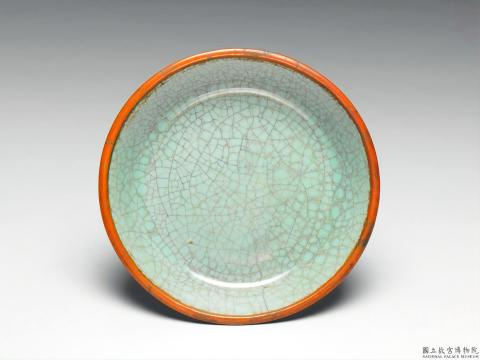An upcoming special exhibition at the National Palace Museum Southern Branch is to feature 13 antique pottery pieces from the Northern Song Dynasty known as ru ware (汝窯), which it said experts consider the “rarest of rarities.”
While 300 pottery items are to be on display, the ru ware created for the imperial court would be the most eye-catching, said Weng Yu-wen (翁宇雯), an assistant researcher at the museum’s southern branch and the planner of the exhibition.
Only 21 objects in the museum’s pottery collection of 25,000 items are ru ware, which are usually displayed individually as the centerpiece of an exhibit, she said on Sunday, adding that the museum has not arranged so many for simultaneous public viewing since the “Grand View” exhibit in 2006.

Photo courtesy of the National Palace Museum Southern Branch
Previously part of the collection of the Qing Dynasty’s Qianlong emperor, the museum’s ru-ware pieces are marked by unusual size and fine crazing, which resembles an insect’s wings, Weng said, adding that the items to be exhibited are “priceless.”
In 2017, a ru-ware brush-washer dish belonging to United Microelectronics Corp founder Robert Tsao (曹興誠), which is of quality inferior to that of any piece owned by the museum, was auctioned at Sotheby’s Hong Kong for HK$294.3 million (US$37.6 million at the current exchange rate), she said.
About half of the exhibit’s other artifacts would be comprised of other Chinese imperial workshop products from the Song, Ming and Qing dynasties, while the other half would be porcelain from Southeast and Northeast Asia, Weng said.
The exhibit was originally conceived with a pan-Asian focus, she said, but added that the plans were expanded after National Palace Museum Director Wu Mi-cha (吳密察) said that the museum should do more to serve the needs of the nation’s central and southern regions.
The exhibition is to run from Saturday next week to Nov. 1, with the entrance fee waived on weekends and holidays until Aug. 31, the museum said, adding that closing time would be extended to 6pm during the period.

Alain Robert, known as the "French Spider-Man," praised Alex Honnold as exceptionally well-prepared after the US climber completed a free solo ascent of Taipei 101 yesterday. Robert said Honnold's ascent of the 508m-tall skyscraper in just more than one-and-a-half hours without using safety ropes or equipment was a remarkable achievement. "This is my life," he said in an interview conducted in French, adding that he liked the feeling of being "on the edge of danger." The 63-year-old Frenchman climbed Taipei 101 using ropes in December 2004, taking about four hours to reach the top. On a one-to-10 scale of difficulty, Robert said Taipei 101

Nipah virus infection is to be officially listed as a category 5 notifiable infectious disease in Taiwan in March, while clinical treatment guidelines are being formulated, the Centers for Disease Control (CDC) said yesterday. With Nipah infections being reported in other countries and considering its relatively high fatality rate, the centers on Jan. 16 announced that it would be listed as a notifiable infectious disease to bolster the nation’s systematic early warning system and increase public awareness, the CDC said. Bangladesh reported four fatal cases last year in separate districts, with three linked to raw date palm sap consumption, CDC Epidemic Intelligence

US climber Alex Honnold left Taiwan this morning a day after completing a free-solo ascent of Taipei 101, a feat that drew cheers from onlookers and gained widespread international attention. Honnold yesterday scaled the 101-story skyscraper without a rope or safety harness. The climb — the highest urban free-solo ascent ever attempted — took just more than 90 minutes and was streamed live on Netflix. It was covered by major international news outlets including CNN, the New York Times, the Guardian and the Wall Street Journal. As Honnold prepared to leave Taiwan today, he attracted a crowd when he and his wife, Sanni,

Taiwanese and US defense groups are collaborating to introduce deployable, semi-autonomous manufacturing systems for drones and components in a boost to the nation’s supply chain resilience. Taiwan’s G-Tech Optroelectronics Corp subsidiary GTOC and the US’ Aerkomm Inc on Friday announced an agreement with fellow US-based Firestorm Lab to adopt the latter’s xCell, a technology featuring 3D printers fitted in 6.1m container units. The systems enable aerial platforms and parts to be produced in high volumes from dispersed nodes capable of rapid redeployment, to minimize the risk of enemy strikes and to meet field requirements, they said. Firestorm chief technology officer Ian Muceus said